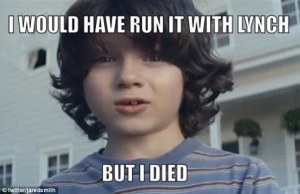Super Bowl Commercials through a PR Lens
I must admit that, though my love for some good ol’ American football is tried-and-true, at least one third of my enjoyment of the Super Bowl lies in its commercials. One can usually expect to feel all warm and fuzzy, to chuckle here and there and even to heartily laugh at least once as the commercials continue to air throughout the game. This year, I found myself giggling far less and coming close to tears instead. Of course, not all of the commercials followed this trend: Doritos gave a humorous performance as always and Carl’s Jr. gave a predictable sexual one. But for the most part it was a rather sentimental and even depressing year for the advertising world.
Downfield
Dove’s Men + Care commercial, which showed various precious moments between father and child, tugged at our heart strings and defied the typical “macho man” archetype featured in most men’s deodorant advertisements (see: Axe and/or Old Spice). Dodge left us feeling nostalgic and hyper-aware of the beautiful power of grandparents with their #DodgeWisdom campaign commercial, in which a handful of 100+ year-olds gave us life advice. But the real kicker this year was Nationwide’s commercial for its “Make Safe Happen” campaign, wherein a young boy lists off all of the things that he was never able to do (including riding a bike, getting cooties, traveling the world etc.) because he died in an accident. Not only did this ad immediately get the viewer’s attention, but it also sparked a fairly surprising, though not entirely unforeseeable, controversy.
Defensive back
So here’s what I find interesting: Nationwide, because of its proactive PR actions, must now take reactive PR pains to defend itself. Allow me to explain. Technically, the “Make Safe Happen” campaign is a great Public Relations move – it showcases Nationwide’s concern for the well-being of the public, as well as for its clientele. It reassures us that Nationwide isn’t just about big money and big insurance; rather, it values (and encourages) taking safety precautions that might prevent the need for its services entirely. Job well done, right? Yes, but here’s where it all goes downhill: the commercial that aired during the Super Bowl garnered much more attention for its shocking and somewhat horrifying “punchline” than it did for Nationwide’s actual campaign. Since it aired, countless tweets, memes and articles have been published addressing the commercial’s controversial nature. All of a sudden, Nationwide’s “good move” has turned into a small fiasco – one from which it needs saving. In an effort to do so, it seems as though Nationwide’s executives are choosing to stand behind the commercial, while simultaneously re-directing our attention to the intended message that didn’t quite seem to come across effectively. Here is Nationwide’s official response:
“Preventable injuries around the home are the leading cause of childhood deaths in America. Most people don’t know that. Nationwide ran an ad during the Super Bowl that started a fierce conversation. The sole purpose of this message was to start a conversation, not sell insurance. We want to build awareness of an issue that is near and dear to all of us — the safety and well-being of our children. We knew the ad would spur a variety of reactions. In fact, thousands of people visited MakeSafeHappen.com, a new website to help educate parents and caregivers with information and resources in an effort to make their homes safer and avoid a potential injury or death. Nationwide has been working with experts for more than 60 years to make homes safer. While some did not care for the ad, we hope it served to begin a dialogue to make safe happen for children everywhere.”
Though the statement is pretty well-said and Nationwide seems to have made a decent recovery, one can’t help but sigh at the thought that good PR broadcasted to the public in a not-so-good way only makes for bad PR.
I applaud the effort, Nationwide, but recommend that you exercise caution next time.
